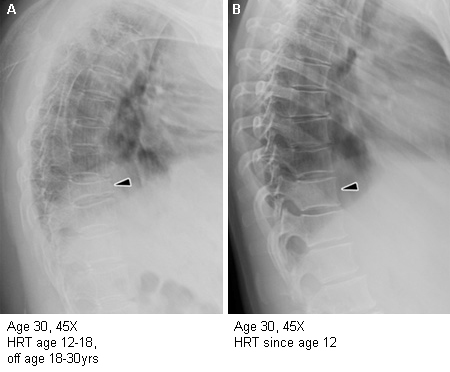Patient discussions
Young girls with Turner syndrome need a lot of psychosocial support in adjusting to the issues of premature ovarian failure and possible social difficulties. They also need particular education about the importance of continued oestrogen treatment to maintain bone health.
Older girls and young adults need counselling on diet and exercise to prevent cardiovascular complications.
Adults with Turner syndrome should be encouraged to have a list of potential medical problems and a calendar to keep track of tests needed on an annual basis. The importance of ovarian hormone replacement to prevent severe premature osteoporosis should be stressed to patients with premature ovarian failure. [Figure caption and citation for the preceding image starts]: Importance of oestrogen therapy in young adults with Turner syndrome (TS): X-ray figure A shows near collapse of T11, diffuse osteoporosis, and dorsal kyphosis in a woman with TS who discontinued HRT at age 18 years. Figure B shows normal spinal architecture and bone health in another woman with TS, age 30 years, who has taken HRT consistently since age 12.8 yearsFrom the personal collection of Carolyn Bondy, MS, MD (NIH study) [Citation ends].
Most women with Turner syndrome are infertile, but spontaneous menses and pregnancies may occur in 2% to 3%. There is increased incidence of a fetus with aneuploidy when using their own oocytes. Pregnancy exacerbates underlying metabolic, hypertensive, and cardiovascular problems and may be catastrophic for women with Turner syndrome; therefore, girls over the age of 10 years need close monitoring with regard to potential fertility and education on reproductive issues and sexual behaviours. Moreover, infertile adults with Turner syndrome may be interested in pregnancy via assisted reproduction using donor oocytes. Such pregnancies have an unusually high risk for maternal death from aortic dissection or rupture, and from pre-eclampsia and its complications.[42][43] Thus, very stringent pre-pregnancy screening and patient education as to risks are imperative prior to attempting assisted reproduction for women with Turner syndrome.[44] Endocrine Society: transitions of care Opens in new window Turner Syndrome Society of US Opens in new window
Use of this content is subject to our disclaimer